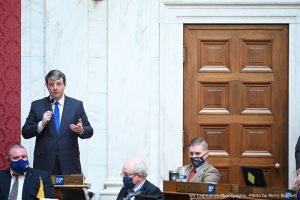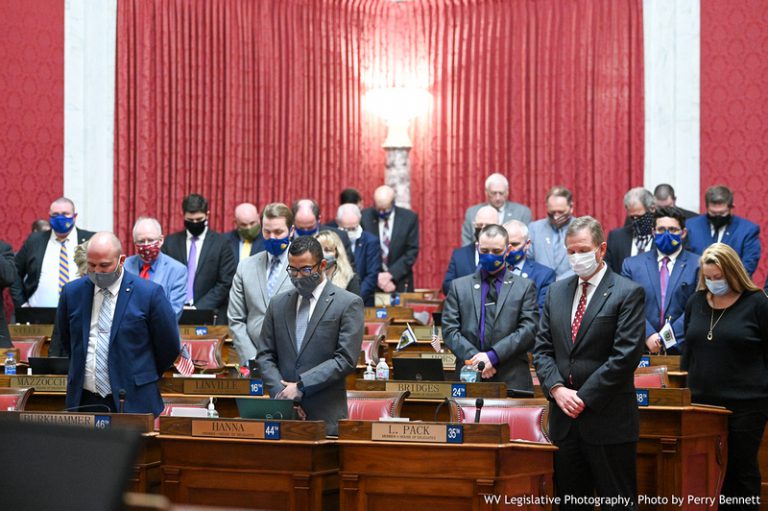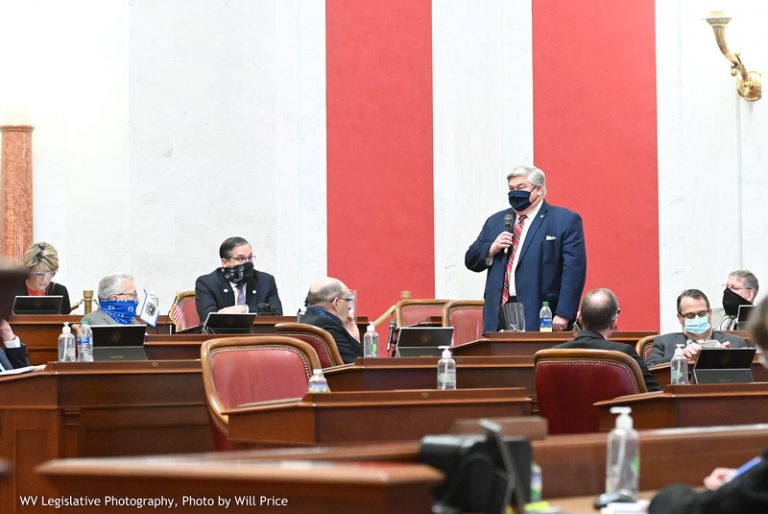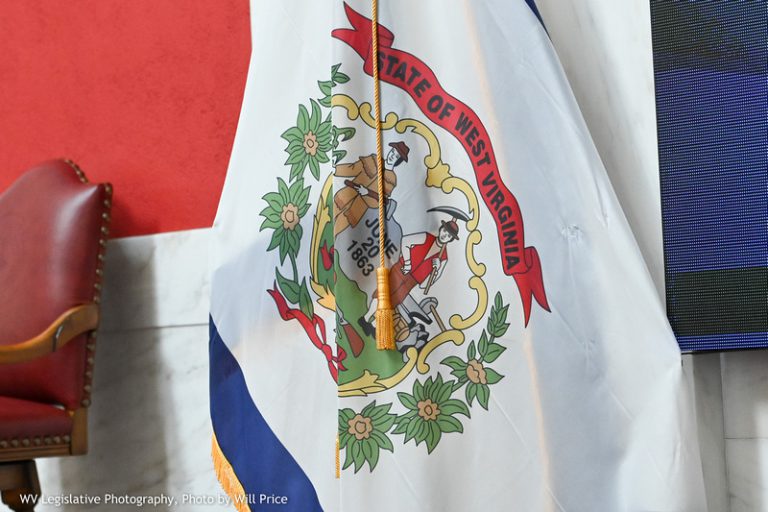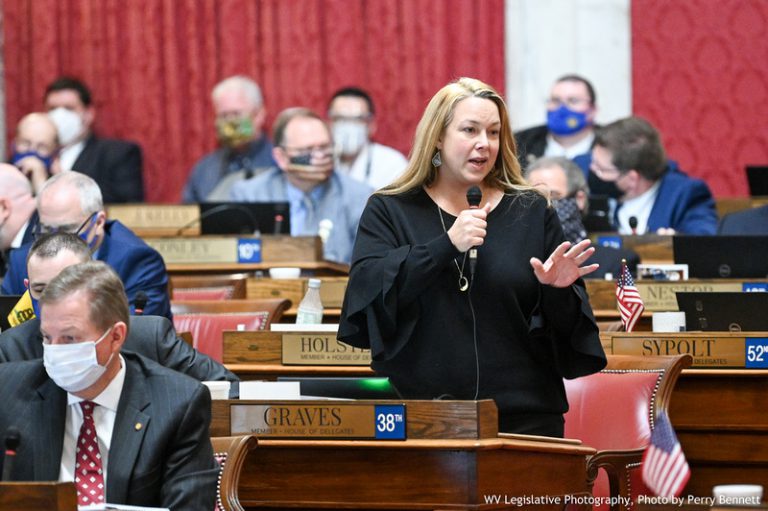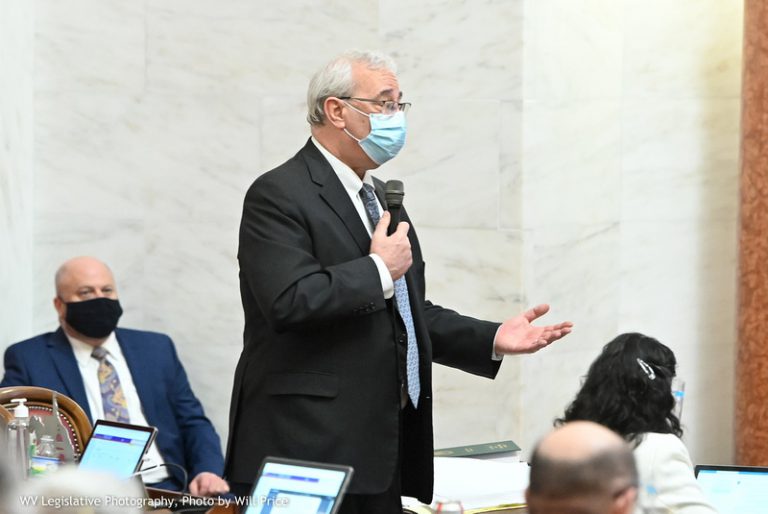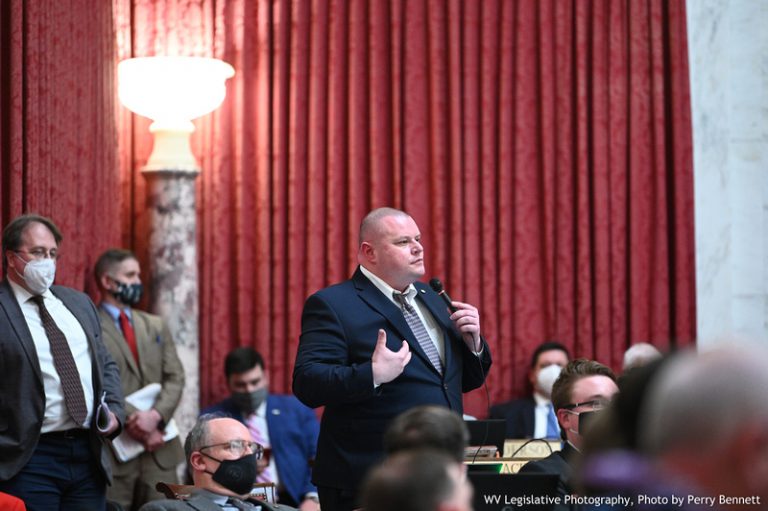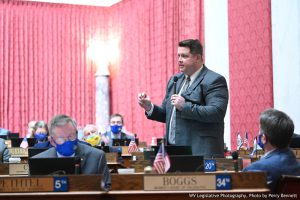As of Friday, April 2, 2021, 1315 bills have been introduced to the House. Of those bills, 200 have passed and advanced to the Senate.
House Bill 3301 revise the West Virginia Tax Increment Financing Act to authorize a county commission or municipality to modify the termination times of certain districts.
House Bill 3299 authorizes legislative rules of the Higher Education Policy Commission.
House Bill 3266 allows teachers and service personnel apply for, and contract for, extracurricular assignments after retirement.
House Bill 3254 allows members of development authorities to receive federally authorized reimbursement for service which the member rendered on a voluntary basis.
House Bill 2981 creates a suicide prevention assistance program for veterans within the state. The bill also requires reporting of veteran suicides and suspected veteran suicide.
House Bill 2933 creates the Anti-Discrimination Against Israel Act, which prevents state agencies, political subdivisions, and pension plans from doing businesses with or investing in companies that boycott Israel.
House Bill 2842 prohibits municipalities from banning certain utility companies.
House Bill 2726 allows for the lease of air space above public roads and highways owned or controlled by a political subdivision of the state and the safe operation of unmanned aircraft.
House Bill 2694 prevents any agency of this state, political subdivision of this state, or employee of an agency or political subdivision of this state acting in his or her official capacity from assisting federal law enforcement officers in the investigation or enforcement of alleged violations of federal firearm laws which are not also violations of the laws of this state.
House Bill 2573 provides transparency and accountability of state grants to reduce waste, fraud, and abuse.
House Bill 2145 add four student aide titles to the class titles for school personnel.
House Bill 3303 clarifies the process for filling vacancies on ballots and provides that no appointment to an unfilled vacancy may be made after a primary election.
House Bill 3300 reduces personal income taxes on a percentage basis. The bill creates the income tax reduction fund.
House Bill 3002 requires the Commissioner of Highways to post online at the Division of Highways website any petition, order, or decision to the abandonment or discontinuance of any state highway or road. The bill allows any member of the public to participate in or attend any hearing related to the abandonment or discontinuance of any state highway or road by virtual means.
House Bill 2962 removes the requirement that the practical exam be performed on a real person. Since COVID-19, a mannequin has been used. The bill removes restrictions on advertising. It changes practicing dentistry without a license from a misdemeanor to a felony.
House Bill 2890 clarifies the authority of the Public Service Commission of West Virginia over luxury limousine services.
House Bill 2793 allows out of state residents to obtain WV concealed carry permits for $100
House Bill 2773 allows the DNR to issue up to 100 permits for boats greater than 10 horsepower on the Upper Mud River Lake.
House Bill 2747 transfers the Parole Board to the Office of Administrative Hearings. It sets the number of board members to 10 and sets requirements for members. The bill states the Chief Hearing Officer will be appointed by the Governor and serve as chair of the board. It also requires that all parole board hearings be open to the public.
House Bill 3304 authorizes the Commissioner of the Division of Correction and Rehabilitation to establish a program of reentry and transitional services that may be used for eligible offenders who are sentenced to serve a term of imprisonment under the custody of the Division of Corrections and Rehabilitation whom the Commissioner or the circuit court may permit to service his/her sentence as a sentence to reentry and transitional services to cut the cost of confinement and promote transition of the offender into society. The program would assist with academic education, vocational education, employment, counseling, housing, and substance abuse
House Bill 3298, a supplemental appropriation bill, amends appropriations for the Board of Education, the WV Development Office, Bureau of Senior Services, and the Civil Contingent Fund during the fiscal year 2021.
House Bill 3106 increases the time for a bond hearing from 72 hours to 5 days. The bill allows for a defendant to be released from jail if the bond hearing is not held unless the defendant is incarcerated for a crime against the person.
House Bill 3082 helps stabilize funding sources for the WVDEP Division of Air Quality.
House Bill 2915 increases available funds in the Public Records and Preservation Revenue Account for grants to counties for records management, access, and preservation purposes.
House Bill 2790, a supplemental appropriation bill, makes changes to appropriations for the Division of Highways during the fiscal year 2021.
House Bill 2769, a supplemental appropriation bill, makes changes to appropriations for the Division of Motor Vehicles during the fiscal year 2021.
House Bill 2768, a supplemental appropriation bill, increases the appropriation to the Division of Highways for maintenance during the fiscal year 2021.
House Bill 2720 allows the Secretary of the Department of Transportation to establish a merit-based personnel administration system for all the department’s employees. The DOT will have until October 31, 2021, to establish the new system.
House Bill 2667 promotes cost savings for state taxpayers by implementing an energy savings program for assessment and implementation of energy savings goals for state buildings.
House Bill 2581 changes the valuation, assessment, review, and appellate rights of property owners regarding valuation, classification, and taxability of real estate properties by the Tax Commissioner. It allows for the publication, release, and other disclosure of nonpropriety financial information by the Joint Committee on Government and Finance.
House Bill 2493 makes changes to the Tax Departments’ method of property taxation. The six changes made are: 1.) The method will rely on the most recent calendar year’s coal prices, not a three-year average. 2.) The average coal density shall be a flat average of 1800 tons per acre-foot unless the taxpayer provides evidence to establish a lower density value. 3.) Tax Commission shall consider economic viability and engineering ponderations when establishing values of coal properties. 4.) Coal beds less than 35 inches shall not be classified as minable coal for valuation of property tax. 5.) Coal seams may not be classified for taxation until the actual depletion of coal commences under a permit. 6.) Non-filers shall be subject to penalties equal to and uniform with all forms of industrial property and natural resources property.
House Bill 2266 provides Medicaid coverage up to 1 year postpartum. Currently, coverage is only 60 days postpartum.
House Bill 3312 establishes a memorial in Fairmont, WV to child labor and child workers who died in the course of employment in this state.
House Bill 3311 limits the cost of obtaining medical records to a fee consistent with HIPAA.
House Bill 3310 limits the jurisdiction of the Public Service Commission.
House Bill 3308 increases the number of video lottery terminals allowed in an establishment from seven to 10.
House Bill 3307 creates the Social Media Integrity and Anti-Corruption in Elections Act.
House Bill 3297, a supplemental appropriation bill, increases appropriations to the Department of Veterans’ Assistance for fiscal year 2021.
House Bill 3295, a supplemental appropriation bill, increases appropriations to the Department of Health and Human Resources for fiscal year 2021.
House Bill 3292, a supplemental appropriation bill, increases the appropriations for the Department of Health and Human Resources for fiscal year 2021.
House Bill 3291, a supplemental appropriation bill, increases appropriations for the Department of Homeland Security for fiscal year 2021.
House Bill 3289, a supplemental appropriation bill, increases appropriations for the Department of Commerce for fiscal year 2021.
House Bill 3288, a supplemental appropriation bill, changes appropriations within the Department of Health and Human Resources for fiscal year 2021.
House Bill 3287, a supplemental appropriation bill, increases appropriations for the Department of Homeland Security for fiscal year 2021.
House Bill 3286, a supplemental appropriation bill, increase appropriation for the Division of Human Services for fiscal year 2021.
House Bill 3089 makes utility workers essential employees during a state of emergency.
House Bill 3074 requires the Board of Education to provide information about organ donation to high school students and higher education students.
House Bill 3072 sunsets the Board of Forestry and transfers responsibility to the Division of Forestry. It removes the license requirements. The bill states a list of foresters with four-year and two-year degrees be maintained by the Division.
House Bill 3036 sunsets the Board of Sanitarians.
House Bill 3030 authorizes the Commissioner of the Division of Highways to allow an increase of gross weight limitation and dimensional restrictions on certain roads in Greenbrier and Pocahontas Counties.
House Bill 2997 adds a defense to civil penalty impose for a result of delivery of fuel to a state other than the destination state printed on the shipping document for fuel. This will update our code and bring it in line with surrounding states to collect taxes more properly.
House Bill 2927 adds caregiving expenses to lawful elections, The Secretary of State would create rules relating to the expenses.
House Bill 2918 makes the Family Drug Treatment Court permanent.
House Bill 2908 requires high-volume third-party sellers to provide information to online marketplaces. High volume is defined as 200+ transitions or $5,000+ for 12 months continuous.
House Bill 2884 provides protection for customers of municipality owned utilities.
House Bill 2876 modifies the five-year waiting period and 100-person minimum for an association health plan. The bill allows new flexibility granted under federal rules. This bill puts code in line with the ACA.
House Bill 2751 establishes a system to remediate fiscal emergencies of local governments. The bill modernizes the process for dissolution of municipal corporations in this State
House Bill 2730 allows a debtor in bankruptcy to use the federal law exemptions.
House Bill 2592 provides that all local elections be held on a date that a state election is being held.
House Bill 2488 provides for an occupational limited driver’s license.
House Bill 2370 allows for owners of swimming pools to not have to pay associated costs for sewage when the water used for the pool is not used in the sewer.
House Bill 2095 provides increased protections for the welfare of domestic animals in the care of animal shelters, breeders, and private individuals.
House Bill 2017 the criminal code rewrite, establishes a class system for felony and misdemeanor offenses. If completed, the classes would be as follows: 6 felony classes, 3 misdemeanor classes, and a petty offense. The bill adds the option for enhancements to be added to a charge, which can result in additional time being added if convicted.


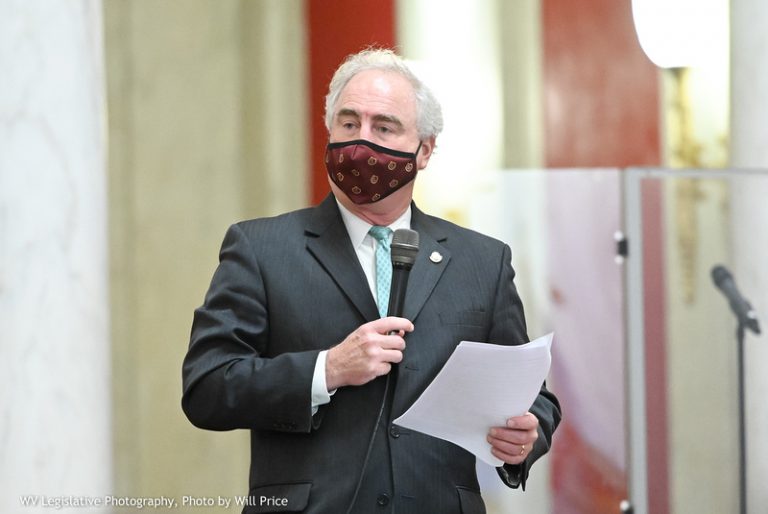
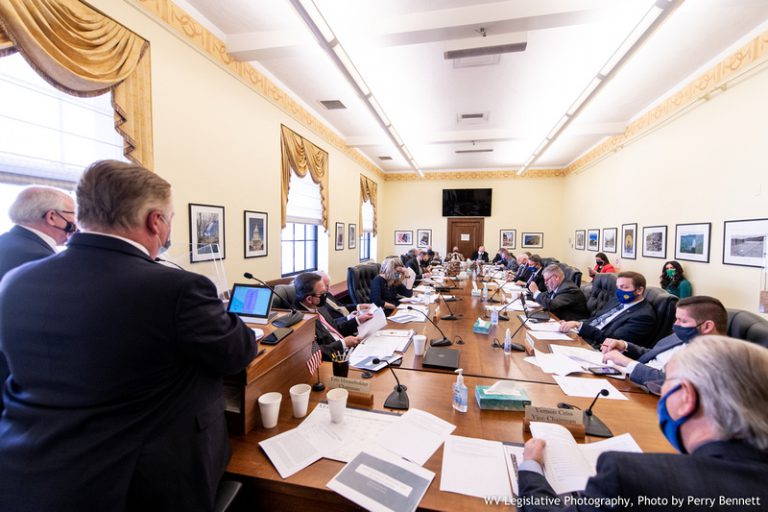
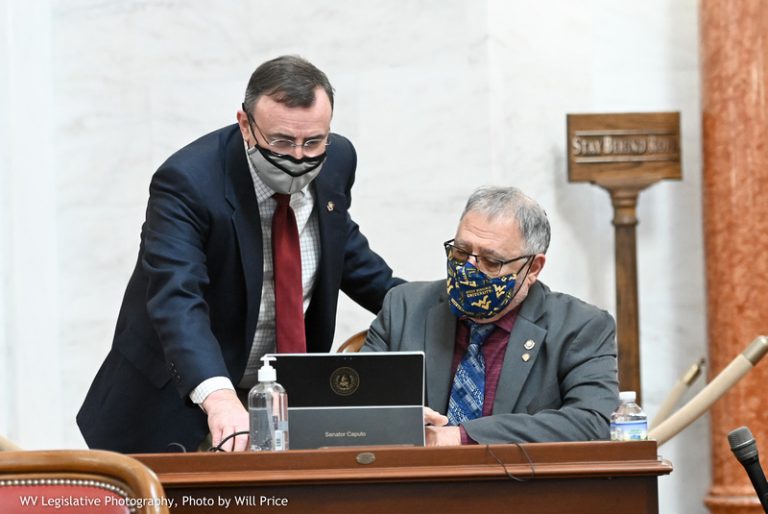
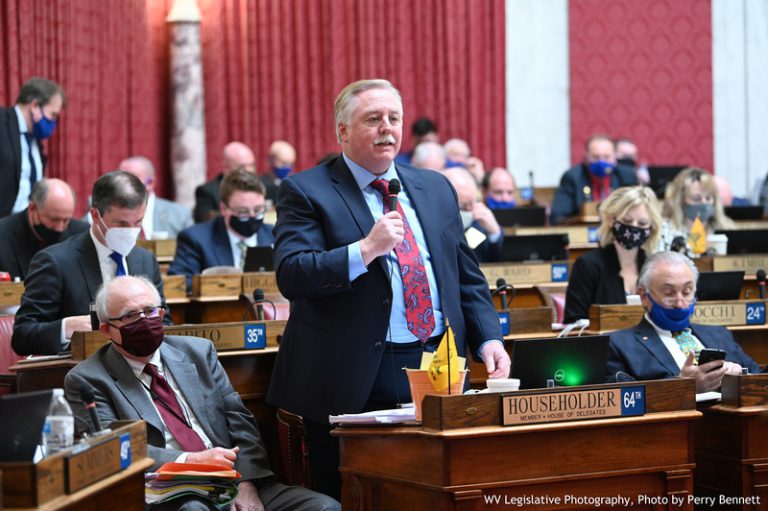
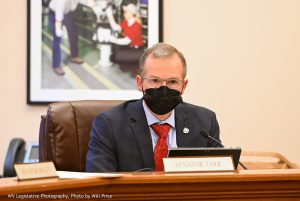 “What this does, is there are 36 million people who travel through West Virginia in a year,” said Senate Finance Committee Chair Sen. Eric Tarr (R-Putnam, 04). “Those people stop at our stores, they stop at our hotels, they stop at our gas stations, they stop at our recreational facilities. Those people from out of state, come in and they spend money on the things that this swaps out. So, it takes the pressure density off of the person who works and lives in West Virginia on carrying nearly half of our state’s budget.”
“What this does, is there are 36 million people who travel through West Virginia in a year,” said Senate Finance Committee Chair Sen. Eric Tarr (R-Putnam, 04). “Those people stop at our stores, they stop at our hotels, they stop at our gas stations, they stop at our recreational facilities. Those people from out of state, come in and they spend money on the things that this swaps out. So, it takes the pressure density off of the person who works and lives in West Virginia on carrying nearly half of our state’s budget.”